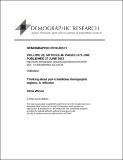Files in this item
Thinking about post-transitional demographic regimes : a reflection
Item metadata
| dc.contributor.author | Wilson, Christopher Cleveland Boag | |
| dc.date.accessioned | 2014-07-10T14:31:15Z | |
| dc.date.available | 2014-07-10T14:31:15Z | |
| dc.date.issued | 2013-06-27 | |
| dc.identifier | 131113618 | |
| dc.identifier | e8fb8bb1-2fc9-40a4-b99c-97490f38c15a | |
| dc.identifier | 000320984400001 | |
| dc.identifier | 84884201345 | |
| dc.identifier.citation | Wilson , C C B 2013 , ' Thinking about post-transitional demographic regimes : a reflection ' , Demographic Research , vol. 28 , 46 , pp. 1373-1388 . https://doi.org/10.4054/DemRes.2013.28.46 | en |
| dc.identifier.issn | 1435-9871 | |
| dc.identifier.uri | https://hdl.handle.net/10023/5010 | |
| dc.description.abstract | BACKGROUND: For the last 70 years the concept of the demographic transition has provided a basis for understanding and predicting population trends in the developing world. However, a majority of the developing world's population will soon be post-transitional - what will happen then? This paper attempts to outline where answers to this question might be found. It suggests that a valuable way to organise the study of these issues is the concept of the demographic regime. OBJECTIVE: The aim of the paper is to encourage discussion on the nature of post-transitional demographic regimes around the world, especially in the developing world. The style of the reflection is that of a speculative essay - a Denkstuck or ballon d'essai. SCOPE: In addition to a discussion of the concept of a demographic regime, the paper looks at three possible sources of information on the determinants of post-transitional regimes in the developing world: 1) the nature of the transition itself, 2) lessons drawn from pre-transitional regimes, and 3) demographic trends in Europe and other developed countries, some which have been post-transitional for several decades. CONCLUSIONS: The paper concludes with a set of suggestions for future research on the topic. | |
| dc.format.extent | 16 | |
| dc.format.extent | 396730 | |
| dc.language.iso | eng | |
| dc.relation.ispartof | Demographic Research | en |
| dc.subject | Population-dynamics | en |
| dc.subject | Transition | en |
| dc.subject | Fertility | en |
| dc.subject | G Geography (General) | en |
| dc.subject.lcc | G1 | en |
| dc.title | Thinking about post-transitional demographic regimes : a reflection | en |
| dc.type | Journal article | en |
| dc.contributor.institution | University of St Andrews. Geography & Sustainable Development | en |
| dc.contributor.institution | University of St Andrews. School of Geography and Geosciences | en |
| dc.contributor.institution | University of St Andrews. School of Geography & Sustainable Development | en |
| dc.identifier.doi | https://doi.org/10.4054/DemRes.2013.28.46 | |
| dc.description.status | Peer reviewed | en |
This item appears in the following Collection(s)
Items in the St Andrews Research Repository are protected by copyright, with all rights reserved, unless otherwise indicated.

